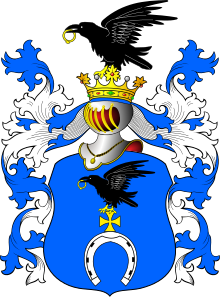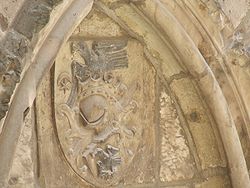Ślepowron coat of arms
| Ślepowron | |
|---|---|
 | |
| Details | |
| Battle cry | Bojno, Bujno |
| Alternative names | Bojno, Bujno, Pesze, Pęszno, Szeptyc, Korwin, Corvin, Ślepy Wron |
| Earliest mention | 1224, 1238 as Ślepowron |
| Towns | Ruda-Huta Lublin Voivodeship |
| Families | 993 surnames according to Tadeusz Gajl’s Polish Heraldry 2009/2010.[1] Ślepowron A: Adziewicz, Andziewicz, Audziewicz, Auxtul, Awdziewicz. |
Ślepowron is a Polish coat of arms. It was used by several szlachta families in the times of the Polish–Lithuanian Commonwealth. From the fifteenth century, the descendants of the Ślepowron family began to use names taken from their lands. This led to many different surnames being created within one family, symbolically united under the Korwin (raven) coat of arms, which is thus unique in Polish heraldry. Wawrzęta Korwin de Ślepowron is the oldest known ancestor of the family, although their oral traditions claim descent from Marcus Valerius Corvus, a Roman general.[7]
Blazon
[edit]
A black raven with a gold ring in its beak and its wings somewhat extended for flight, facing right, standing atop a cross, on the shoulders of a horseshoe standing erect with heels at the bottom.
The shield is blue and the horseshoe silver. Above the shield, on a crowned helmet stands a similar raven.
The horseshoe and cross were added to the coat of arms due to a marriage alliance with the Pobog clan. A later version adopted by many Korwin families is the Korwin coat of arms, in which the raven stands on a log rather than a horseshoe.. [8]
History
[edit]The name Ślepowron is said to be taken from the village of Ślepowrony near Płońsk, Mazowsze, which belonged to the then-established Korwin-Piotrowski family. According to "Herbów Rycerstwa Polskiego" by Bartosz Paprocki) this village was given to the knight Wawrzęta de Ślepowrony by Fr. Konrad Mazowiecki.[9][10]
Motto
[edit]“Kości spròchniałe powstańcie z mogiły, Przywdziejcie ducha i ciało i siły' - Woronicz (found in Herbarz Polski, Hipolit Stupnicki)[11]
Sarmatian Totem
[edit]The raven is of much older, legendary pagan origins. A Polish aristocratic clan of Sarmatian origin chose the raven, possibly as its "rodnidze" or clan totem.
The 1224 Grant
[edit]Many centuries later, a raven is attested in a grant of privilege to Warzęta Korwin z Ślepowrony, from Duke Konrad I of Masovia, given at Warsaw in 1224.
The Roman-Hungarian legend
[edit]The full Korwin shield, with the ring in the raven's beak, came to Poland from Hungary almost two centuries later, via the Roman-Hungarian legend amid contacts between the Polish nobility and the Hungarian Royal Court.
Roman legend
[edit]The Roman tribune Marcus Valerius Corvus, born 370 BC of the gens Valerii, in 349BC accepted a challenge to single combat by a barbarian warrior. During the combat, a raven perched upon Valerius' helmet and pecked his foe's eyes so fiercely that the barbarian was blinded. In memory of his victory, Valerius got the agnomen Corvinus from Corvus (raven). Marcus Valerius Messalla Corvinus (64BC-8AD) was Caesar Augustus' co-consul.
Hungarian/Polish legend
[edit]
In the Kingdom of Hungary, the Wallachian-Hungarian family of Korvin had flourished since the 15th century. Janos Hunyadi and his son Matthias Corvinus Hunyadi, King of Hungary and Bohemia, called themselves "Corvinus" and minted coins displaying a raven with a ring.
The epithet Corvinus was coined by Matthias' biographer, the Italian Antonio Bonfini, who claimed that the Hunyadi family descended from Marcus Valerius Corvinus, , who had supposedly settled on the Dacian-Pannonian frontiers, the future Hungary. This claim was later taken over by the Polish aristocrats connected with the Hungarian Hunyadi family.

House Medonich
[edit]The house of Medonich, of Magyar origin, anciently held territories in the Moldavian region of eastern Hungary, in the forests of Transylvania and Moldavia. The family was recorded to attend the national council of 1221 in which King Andras II issued the Golden Bull according self-determination to the nobles and gentry
Konrada Mazowieckiego established the Slepowron, Stracchowa, Drozkzion and Wola clans in 1224. His descendants through his son Korwin or Corwins were nobles in north Italy. Another branch settled in Drozkzino Latvia and Slavonia. One member of the Medonich family appeared at the Prussian court in 1414 acting as a representative for his family in Galacia; another appeared at Dobryczn in 1674.
King Matthias's Ring
[edit]In addition to the above, the Silesian Annals tell that a raven carried off the ring which King Matthias, (who was also ruler of the Duchy of Głogów, and Suzerain of all the Silesian duchies), had removed from his finger. Matthias chased the bird down and slew it, retrieving the ring - and in commemoration of this event, he took the Raven as a symbol for his signet sign.
Arms derivatives of Ślepowron, alternative drawings and entitled family versions
[edit]- Tadeusz Gajl identifies 30 coats of arms derivatives of Ślepowron:
- Gosiewski[permanent dead link], surname Gosiewski. (Is uncertain if it is derivative of Korwin or Ślepowron).
- Jurzyc[permanent dead link], surnames Jurzyc, Jurzyk.
- Kamecki[permanent dead link], surname Kamecki.
- Kamieński[permanent dead link], surname Kamieński.
- Kossakowski Count[permanent dead link], surname Kossakowski.
- Krakowski Count[permanent dead link], surname Krakowski.
- Krasiński Count 1[permanent dead link], surname Krasiński.
- Krasiński Count 2[permanent dead link], surname Krasiński.
- Krasiński Count 3[permanent dead link], surname Krasiński.
- Kudelski[permanent dead link], surname Kudelski.
- Kurkowski[permanent dead link], surname Kurkowski.
- Leśniewski[permanent dead link], surname Leśniewski.
- Lisowski[permanent dead link], surname Lisowski also Lissowski.
- Luberadzki[permanent dead link], surname Luberadzki.
- Lutostański[permanent dead link], surname Lutostański
- Mieroszewski Count[permanent dead link], surname Mieroszewski.
- Milan[permanent dead link], surnames Milewski, Zaorski.
- Milewski Count[permanent dead link], surname Milewski.
- Nachtraba[permanent dead link], surnames Nachtrab, Nachtraba.
- Olszweski IV[permanent dead link], surname Olszewski.
- Olszewski V[permanent dead link], surname Olszewski.
- Pawłowski Count[permanent dead link], surname Pawłowski.
- Rabe[permanent dead link], surname Rabe.
- Pokrzywnicki[permanent dead link], surname Pokrzywnicki.
- Rosyniec[permanent dead link], surnames Górka, Rosiński, Rosyniec.
- Sobobliński[permanent dead link], surname Sobobliński.
- Sobolewski Count[permanent dead link], surname Sobolewski.
- Suchodolski II[permanent dead link], surname Suchodolski.
- Szlubowski Count[permanent dead link], surname Szlubowski.
- Wróblewski[permanent dead link], surname Wróblewski.
- Wykisiały[permanent dead link], surname Wykisiały.
- Coats of arms related to Ślepowron on other way.
Some coats of arms may be related to Ślepowron, yet they are not classified as Derivatives properly, on Polish armorials:
- Czarnowron[permanent dead link], surnames Borowicz, Fijałkowski.
- Kurowski[permanent dead link], surname Kurowski.
- Kudelski[permanent dead link], surname Kudelski.
- Raszyniec[permanent dead link], surnames Maciuk, Maczuk.
- Sandrecki[permanent dead link], surnames Sandrecki, Sendraszyc.
- Siedmiogradzki[permanent dead link], surname Siedmiogradzki.
- Zasulicz[permanent dead link], surname Zasulicz.
- Żukowski[permanent dead link] surnames Kowalewski, Żuchowski, Żuczenko, Żuk, Żukowski.
Notable bearers
[edit]Notable bearers of this coat of arms include:
- Stanisław Sebastian Bronicki
- Augustyn Kordecki
- Gabriel Rzączyński (1664–1737), Polish Jesuit priest and writer
- Kazimierz Pułaski
- Panteleimon Kulish (1819–1897) — Ukrainian writer, critic, poet, folklorist, and translator;
- Pavlo Teteria (1620s–1670) — Hetman of Right-bank Ukraine (1663–1665);
- Ignacy Mościcki President of Poland (1926–1939)
- Wojciech Jaruzelski President of Poland (1989–1990)
- Tadeusz Kłopotowski Senator of Poland (1989-1991)
- Szymon Marcin Kossakowski
- Wincenty Krasiński (in France: comte Vincent Corvin-Krasinski)
- Kazimierz Krasiński
- Zygmunt Krasiński
- Tadeusz Gosiewski
- Grzegorz Skwierczyński
- Przemysław Skwirczyński
- Karol Szymanowski
- Henryk Lowmianski
- Chris Korwin-Kuczynski (21st century) Canadian politician
- Przemysław Gosiewski Deputy Prime Minister of Poland (2007)
- Łukasz Leończuk (1993)
- Otto von Corvin-Wierzbicki (in Germany Otto von Corvin also Otto von Corvin-Wierzbitzky)
- Walenty Nasierowski (1802-1888) [12][13]
Related and Derivative coats of arms
[edit]- Korwin coat of arms
- Czarnowron coat of arms
- Kurowski coat of arms
- Materna coat of arms
- Sandrecki coat of arms
See also
[edit]External links
[edit]- Herbarz Polski - Od Średniowiecza do XX wieku (Tadeusz Gajl) in English and Polish.
- Genealogia Dynastyczna/Dynastic Genealogy (Ryszard Jurzak) in English and Polish.
- Słownik genealogiczny - leksykon (Marcin Niewalda - redaktor naczelny) in Polish.
- Ornatowski.com (Artur Ornatowski) in Polish
- - Herby szlacheckie Rzeczypospolitej Obojga Narodów (Tadeusz Gajl)
- - Herbarz rodowy (Alfred Znamierowski)
- - Szlachta wylegitymowana w Królestwie Polskim w latach 1836-1861(1867), (Elżbieta Sęczys)
- - Ornatowski.com – Rodziny (Artur Ornatowski)
- Wykaz Rodów Szlacheckich (Andrzej Brzezina Winiarski) in Polish.
- Chrząński: Tablice odmian herbowich, tablica XXII - Mały herbarz Adama Kromera i przyjaciół Archived 2011-06-15 at the Wayback Machine (Adam Kromer) in Polish.
- Mały Herbarz (Hetmani wielcy litewscy) Adama Kromera Archived 2013-01-13 at archive.today. in Polish
- Mały Herbarz (Hetmani polni litewscy) Adama Kromera Archived 2013-01-13 at archive.today. in Polish
- Mały Herbarz (Podskarbowie wielcy koronni) Adama Kromera Archived 2011-05-17 at the Wayback Machine. in Polish
- Aleksander Gosiewski and Wincenty Gosiewski (Marcin Gosiewski). in English and Polish.
- Roman family genealogy (Michael Roman). in English
- "Belarusian Nobility Coats of Arms". Slepowron Coat of Arms and bearers. (in English)
- Strona Krassowskich herbu Ślepowron in Polish
- "Wróblewscy herbu Ślepwron" in Polish
- Confederation of the Polish Nobility – List of Members in Polish and English
- Nasierowscy herbu Ślepowron in Polish
- The Lyczkowskis of Slepowron Shield (in English)
References
[edit]- ^ Herbarz Polski / Polish Armorial 2009/2010 (Tadeusz Gajl) Herb Ślepowron[permanent dead link]
- ^ Siarhiej Rybčonak (2007). Armorial of Belarusian Nobility (in Belarusian). Vol. 2. Miensk: НАРБ. pp. 387–388. ISBN 978-985-6372-52-3. (in English)
- ^ Jaŭhien Hlinski (2018). Armorial of Belarusian Nobility (in Belarusian). Vol. 5. Miensk: Беларусь. pp. 554–557. ISBN 978-985-01-1252-1. (in English)
- ^ Dźmitry Matviejčyk (2016). Armorial of Belarusian Nobility (in Belarusian). Vol. 4. Miensk: Беларусь. pp. 769–772. ISBN 978-985-01-1175-3. (in English)
- ^ Siarhiej Rybčonak (2002). Armorial of Belarusian Nobility (in Belarusian). Vol. 1. Miensk: НГАБ. p. 250. ISBN 985-6099-83-8. (in English)
- ^ Dźmitry Matviejčyk (2014). Armorial of Belarusian Nobility (in Belarusian). Vol. 3. Miensk: Беларусь. pp. 58–59. ISBN 978-985-01-1095-4. (in English)
- ^ "Gutowski h. Slepowron".
- ^ "Ryszard Maliszewski - Olkusz ... Z całego świata tamta strona".
- ^ Paprocki, Bartosz (1584). "Herby rycerstwa polskiego".
- ^ "Ślepowron. Autor: Wojciech Jóźwiak".
- ^ Korwin, Ludwik: ’Korwinowie’, Krakow, 1935.
- ^ Polski Słownik Biograficzny. / T. 22 ; Morsztyn Zbigniew - Niemirycz Teodor, pod red. E. Rostworowski,Wrocław : Zakł. Nar. im. Ossolińskich, 1977 s. 585-586
- ^ J. Straszewicz, „Les polonais et les polonaises de la revolution du 29 Novembre 1830″, A. Dinard, Paryż 1832
Literature
[edit]- Mănescu, Jean-Nicholas: Das Oswaldussymbol in der Wappenwelt Osteuropas. Tom C. Bergroth (edited): Genealogica & Heraldica. Report of The 16th International Congress of Genealogical and Heraldic Sciences in Helsinki 16-21 August 1984. Helsinki 1984, p. 415-424. ISBN 951-99640-4-5
